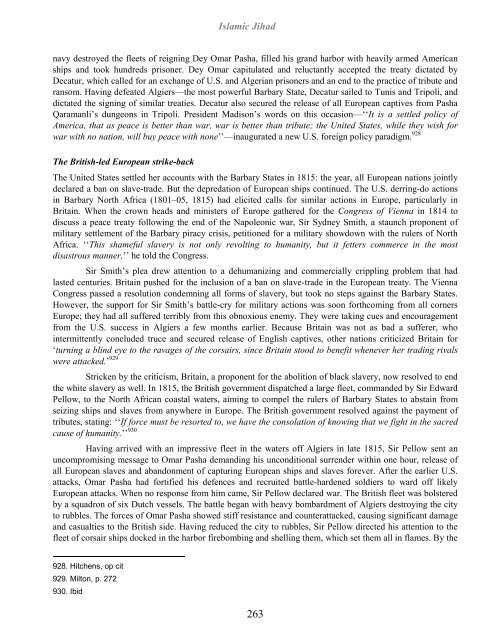islamic-jihad-legacy-of-forced-conversion-imperialism-slavery
islamic-jihad-legacy-of-forced-conversion-imperialism-slavery
islamic-jihad-legacy-of-forced-conversion-imperialism-slavery
- No tags were found...
You also want an ePaper? Increase the reach of your titles
YUMPU automatically turns print PDFs into web optimized ePapers that Google loves.
Islamic Jihadnavy destroyed the fleets <strong>of</strong> reigning Dey Omar Pasha, filled his grand harbor with heavily armed Americanships and took hundreds prisoner. Dey Omar capitulated and reluctantly accepted the treaty dictated byDecatur, which called for an exchange <strong>of</strong> U.S. and Algerian prisoners and an end to the practice <strong>of</strong> tribute andransom. Having defeated Algiers—the most powerful Barbary State, Decatur sailed to Tunis and Tripoli, anddictated the signing <strong>of</strong> similar treaties. Decatur also secured the release <strong>of</strong> all European captives from PashaQaramanli’s dungeons in Tripoli. President Madison’s words on this occasion—‘‘It is a settled policy <strong>of</strong>America, that as peace is better than war, war is better than tribute; the United States, while they wish forwar with no nation, will buy peace with none’’—inaugurated a new U.S. foreign policy paradigm. 928The British-led European strike-backThe United States settled her accounts with the Barbary States in 1815: the year, all European nations jointlydeclared a ban on slave-trade. But the depredation <strong>of</strong> European ships continued. The U.S. derring-do actionsin Barbary North Africa (1801–05, 1815) had elicited calls for similar actions in Europe, particularly inBritain. When the crown heads and ministers <strong>of</strong> Europe gathered for the Congress <strong>of</strong> Vienna in 1814 todiscuss a peace treaty following the end <strong>of</strong> the Napoleonic war, Sir Sydney Smith, a staunch proponent <strong>of</strong>military settlement <strong>of</strong> the Barbary piracy crisis, petitioned for a military showdown with the rulers <strong>of</strong> NorthAfrica. ‘‘This shameful <strong>slavery</strong> is not only revolting to humanity, but it fetters commerce in the mostdisastrous manner,’’ he told the Congress.Sir Smith’s plea drew attention to a dehumanizing and commercially crippling problem that hadlasted centuries. Britain pushed for the inclusion <strong>of</strong> a ban on slave-trade in the European treaty. The ViennaCongress passed a resolution condemning all forms <strong>of</strong> <strong>slavery</strong>, but took no steps against the Barbary States.However, the support for Sir Smith’s battle-cry for military actions was soon forthcoming from all cornersEurope; they had all suffered terribly from this obnoxious enemy. They were taking cues and encouragementfrom the U.S. success in Algiers a few months earlier. Because Britain was not as bad a sufferer, whointermittently concluded truce and secured release <strong>of</strong> English captives, other nations criticized Britain for‘turning a blind eye to the ravages <strong>of</strong> the corsairs, since Britain stood to benefit whenever her trading rivalswere attacked.’ 929Stricken by the criticism, Britain, a proponent for the abolition <strong>of</strong> black <strong>slavery</strong>, now resolved to endthe white <strong>slavery</strong> as well. In 1815, the British government dispatched a large fleet, commanded by Sir EdwardPellow, to the North African coastal waters, aiming to compel the rulers <strong>of</strong> Barbary States to abstain fromseizing ships and slaves from anywhere in Europe. The British government resolved against the payment <strong>of</strong>tributes, stating: ‘‘If force must be resorted to, we have the consolation <strong>of</strong> knowing that we fight in the sacredcause <strong>of</strong> humanity.’’ 930Having arrived with an impressive fleet in the waters <strong>of</strong>f Algiers in late 1815, Sir Pellow sent anuncompromising message to Omar Pasha demanding his unconditional surrender within one hour, release <strong>of</strong>all European slaves and abandonment <strong>of</strong> capturing European ships and slaves forever. After the earlier U.S.attacks, Omar Pasha had fortified his defences and recruited battle-hardened soldiers to ward <strong>of</strong>f likelyEuropean attacks. When no response from him came, Sir Pellow declared war. The British fleet was bolsteredby a squadron <strong>of</strong> six Dutch vessels. The battle began with heavy bombardment <strong>of</strong> Algiers destroying the cityto rubbles. The forces <strong>of</strong> Omar Pasha showed stiff resistance and counterattacked, causing significant damageand casualties to the British side. Having reduced the city to rubbles, Sir Pellow directed his attention to thefleet <strong>of</strong> corsair ships docked in the harbor firebombing and shelling them, which set them all in flames. By the928. Hitchens, op cit929. Milton, p. 272930. Ibid263


